
Xiaflex Coupons & Savings Card – Discount Prices from $7629.06
My prescription
Edit
0.9MG, Xiaflex (1 Solution Reconstituted)
Select pharmacy

Albertsons
$7629.06
COUPON PRICE
Walgreens
$7657.87
COUPON PRICE
Walmart
$7673.37
COUPON PRICEXiaflex savings card
Show this card to your pharmacist
Albertsons
$7629.06
BIN
ID
PCN
GRP
019876
LHEBCE5D20
CHIPPO
LHX
Powered by
Related collagen-specific enzymes prescriptions
Related collagen-specific enzymes prescriptions
Price history for Xiaflex
1 Solution Reconstituted, 0.9MG
Average retail price for Xiaflex
Average SaveHealth price for Xiaflex
Our price history data is based on aggregated prescription data collected from participating pharmacies in America. Our prescription data updates daily to reflect the latest price changes. If you notice a missing data point, it means there wasn't sufficient data available to generate a monetary value for that date.
*Retail prices are based on pharmacy claims data, and may not be accurate when we don't have enough claims.
Xiaflex dosage forms
Dosage Quantity Price from Per unit 0.9MG 1 Solution Reconstituted $7629.06 $7629.06
| Dosage | Quantity | Price from | Per unit |
|---|---|---|---|
| 0.9MG | 1 Solution Reconstituted | $7629.06 | $7629.06 |
What is the Xiaflex injection used for?
Xiaflex injection is used to treat Dupuytren's contracture, a condition where one or more fingers bend towards the palm due to thickening of the tissue. It is also used for Peyronie's disease, which involves the development of fibrous scar tissue inside the penis, causing curved, painful erections.
Why is Xiaflex no longer available?
Xiaflex is still available and has not been discontinued. It is used for the treatment of conditions such as Dupuytren's contracture and Peyronie's disease. If there are any issues with availability, it may be due to supply chain disruptions or specific regional distribution challenges. It is advisable to check with local pharmacies or healthcare providers for the most current information regarding its availability.
How much does Xiaflex cost?
The cost of Xiaflex can vary based on factors such as the pharmacy, location, insurance coverage, and any applicable discounts or assistance programs. It is recommended to contact a local pharmacy or healthcare provider for the most accurate and up-to-date pricing information. Additionally, patients may want to check with their insurance provider to understand coverage and out-of-pocket costs.
How painful is Xiaflex treatment?
Xiaflex treatment can cause some discomfort or pain, particularly during the injection and the manipulation process that follows. Patients may experience swelling, bruising, or tenderness at the injection site. The level of pain varies among individuals, but healthcare providers often recommend pain management strategies, such as over-the-counter pain relievers, to help alleviate discomfort. It is important for patients to discuss any concerns with their healthcare provider before the procedure.
Is Xiaflex still available for Dupuytren's contracture?
Yes, Xiaflex is still available for the treatment of Dupuytren's contracture. It is used to help break down the collagen buildup in the hand that causes the contracture. Patients should consult with their healthcare provider to determine if Xiaflex is an appropriate treatment option for their condition.
